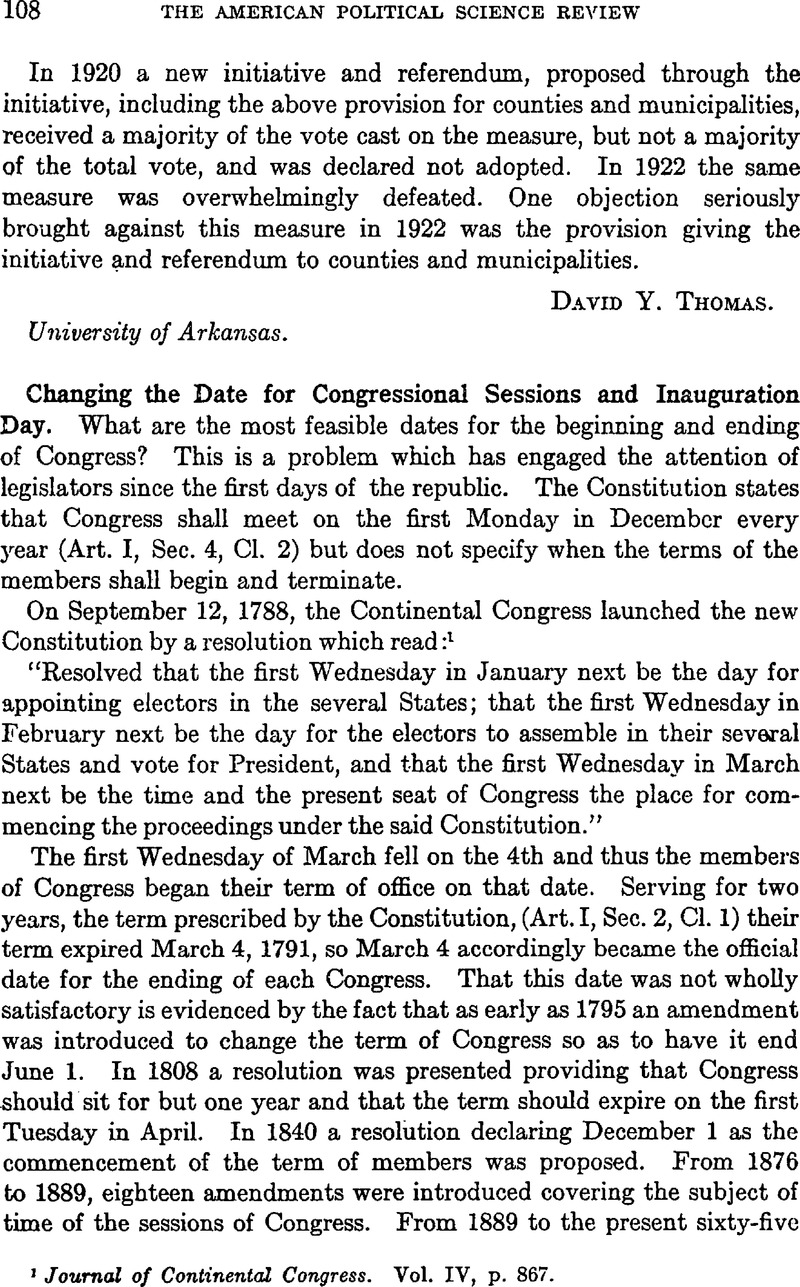No CrossRef data available.
Article contents
Changing the Date for Congressional Sessions and Inauguration Day
Published online by Cambridge University Press: 01 August 2014
Abstract

- Type
- Legislative Notes and Reviews
- Information
- Copyright
- Copyright © American Political Science Association 1924
References
1 Journal of Continental Congress. Vol. IV, p. 867.
2 House Report No. 543, 52nd Congress, 1st Session. This report states: The Republicans carried the Congressional election in 1888, while the Democrats were victorious in 1890, yet the Mills Congress in one instance, and the McKinley Congress in the other, continued to legislate for the country although repudiated at the polls.
3 House Report No. 543, 52nd Congress, 1st Session. This report states: Due to lack of time the deficiency bill of the 2nd Session, 49th Congress failed of passage.
4 Beard, Charles A.American Government and Politics, p. 249.Google Scholar Mr. Shafroth, an ex-Congressman, speaking of the second session, said: “It is then that some are open to propositions which they would never think of entertaining if they were to go before the people for reëlection. It is then that the attorneyship of some corporation is often tendered, and a vote is afterward found in the Record on favor of legislation of a general or special character favoring corporations.”
5 Congressional Record, Vol. 24, Pt. 1, p. 489.
6 Ibid, p. 495.
7 Ibid, p. 499.
8 Congressional Record, May 10, 1898, p. 4763.
9 Ibid, p. 4772.
10 Ibid, p. 4827.
11 Congressional Record, Jan. 14, 1910, p. 646.
12 House Report No. 369, March 16, 1910, 61st Cong. 2nd Sess.
13 Congressional Record, May 16, 1910, p. 6368.
14 Senate Report No. 212, 63rd Cong. 1st Sess.
15 Senate Report No. 212, 63rd Cong. 1st Sess.
16 Congressional Record, March 16, 1910, p. 3264.
17 House Report No. 769, 55th Congress, 2nd Session.
18 Congressional Record, Jan. 10, 1893, pp. 483–500.
19 Congressional Record, May 10, 1898, p. 4763.
20 Ibid, p. 4772.
21 1821, 1849, 1877, 1917, 1945, 1973.
22 Congressional Record, 52nd Cong., 2nd Sess., p. 483. Mr. English of N. J.
23 Congressional Record, March 16, 1910, p. 3264.
24 Senator Caraway's resolution read as follows:
“Whereas this is a representative Government speaking for and interpreting the will of the people of the United States as expressed at the polls; and
“Whereas no Representative in either branch of Congress has the moral right to support or vote for any measure which the people by their votes have repudiated; and
“Whereas certain proposed legislation affecting a fundamental change in our economic and commercial policy is now recommended by the Executive for consideration by Congress; and
“Whereas this proposed legislation has failed to receive the approval of the voters as evidenced by the elections recently held; and
“Whereas Congress has been called into extraordinary session for the purpose of passing this legislation which the people have by imperative and unmistakable mandate repudiated; and
“Whereas a Congress which adopts legislation in defiance of a popular mandate to the contrary would perpetrate an act of usurpation; and
“Whereas many advocates of the ship subsidy bill in the present Congress have been rejected by emphatic majorities by their constituents; and
“Whereas it is unwise to place in the hands of rejected public servants the power to adopt fundamental legislation; and
“Whereas a sense of official propriety would suggest to the defeated Members the unwisdom of participating in legislation which, if enacted, would materially affect fundamental questions of public policy; Therefore be it
“Resolved, etc., I. That it is the sense of the Senate of the United States that all Members defeated at the recent polls abstain from voting on any but routine legislation, such as necessary supply bills, motions to adjourn, or motions to recess, and such other legislation as does not involve any material change of national policy.
“II. That chairmen of committees, not in sympathy with the people's wishes as expressed at the polls, and which have an important effect on legislation, resign from their respective chairmanships, so that their places may be filled by those who are known to be willing to carry into legislative effect the mandate of the people as expressed at the polls on the 7th day of November, 1922.
“III. That the Senate of the United States reaffirm their readiness to bow to the people's will, when expressed at the polls, and declare that the vote of want of confidence in the leaders which has been registered shall not be disregarded.” Congressional Record, Vol. 64, Part 4, page 3495.
25 Congressional Record, Vol. 64, Pt. 4, page 3505.
26 Congressional Record, Vol. 64, Pt. 4, pp. 3500–37.
27 On this Senator Robinson of Arkansas said: “If it is desirable that the impulse and the impetuous demand for reform sometimes reflected in elections shall not be too promptly responded to, it is of even greater importance that when a question has been made an issue in a political campaign, when the voters have registered their decision and judgment affecting it, those who have been discredited and defeated shall not be permitted to defy the power which exalted them and override the will of the constituency by whose favor they enjoy public office.” Ibid, p. 3494.
28 Congressional Record, Vol. 64, Pt. 4, p. 3540.
29 Ibid, p. 3648.
30 Ibid, p. 4341.





Comments
No Comments have been published for this article.